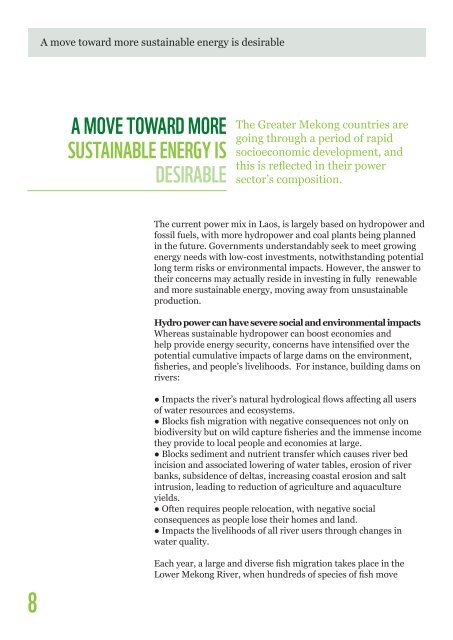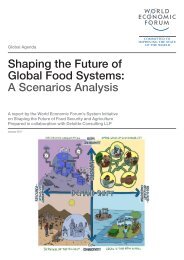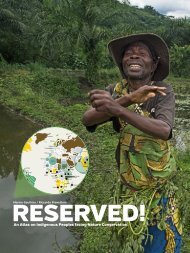Vision 2050
wwf_greater_mekong_power_sector_vision_2050
wwf_greater_mekong_power_sector_vision_2050
You also want an ePaper? Increase the reach of your titles
YUMPU automatically turns print PDFs into web optimized ePapers that Google loves.
A move toward more sustainable energy is desirable<br />
A MOVE TOWARD MORE<br />
SUSTAINABLE ENERGY IS<br />
DESIRABLE<br />
The Greater Mekong countries are<br />
going through a period of rapid<br />
socioeconomic development, and<br />
this is reflected in their power<br />
sector’s composition.<br />
The current power mix in Laos, is largely based on hydropower and<br />
fossil fuels, with more hydropower and coal plants being planned<br />
in the future. Governments understandably seek to meet growing<br />
energy needs with low-cost investments, notwithstanding potential<br />
long term risks or environmental impacts. However, the answer to<br />
their concerns may actually reside in investing in fully renewable<br />
and more sustainable energy, moving away from unsustainable<br />
production.<br />
Hydro power can have severe social and environmental impacts<br />
Whereas sustainable hydropower can boost economies and<br />
help provide energy security, concerns have intensified over the<br />
potential cumulative impacts of large dams on the environment,<br />
fisheries, and people’s livelihoods. For instance, building dams on<br />
rivers:<br />
● Impacts the river’s natural hydrological flows affecting all users<br />
of water resources and ecosystems.<br />
● Blocks fish migration with negative consequences not only on<br />
biodiversity but on wild capture fisheries and the immense income<br />
they provide to local people and economies at large.<br />
● Blocks sediment and nutrient transfer which causes river bed<br />
incision and associated lowering of water tables, erosion of river<br />
banks, subsidence of deltas, increasing coastal erosion and salt<br />
intrusion, leading to reduction of agriculture and aquaculture<br />
yields.<br />
● Often requires people relocation, with negative social<br />
consequences as people lose their homes and land.<br />
● Impacts the livelihoods of all river users through changes in<br />
water quality.<br />
8<br />
Each year, a large and diverse fish migration takes place in the<br />
Lower Mekong River, when hundreds of species of fish move




